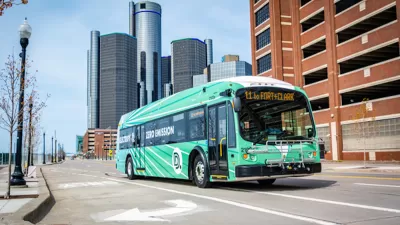Planners and citizens in Detroit are wrapping up a year's worth of research and community engagement before drafting an urban livestock ordinance.
Christine Ferretti reports on the debate in Detroit over an ordinance expected to appear before the City Council in early 2016 that would allow residents to keep livestock, like sheep, honeybees, chickens, and other animals, in urban areas.
"An interest in urban livestock has been growing in Detroit in recent years, but some are worried about health implications, zoning allowances, animal care standards and oversight," according to Ferretti. Following the interest, the city convened an urban livestock working group a year ago "to study local and national policies as well as zoning, animal control, regulation and care strategies for Detroit."
Now a proposed ordinance, "expected to address permitting, euthanasia practices, noise and odor control, waste management and sheltering," should be ready for a hearing in front of the city's Planning Commission by the beginning of next year and the City Council in February or March. Ferretti also reports that the "ordinance wouldn’t allow livestock to be kept as companion animals, like dogs and cats. Rather, keeping livestock would be classified as an accessory activity for grazing on vacant lots and producing eggs, meat, milk and honey."
The article includes more details about the types of animal husbandry that would be allowed under the new ordinance, what it takes to maintain livestock in an urban setting, and voices from either side of the political debate leading up the City Council decision.
FULL STORY: Farm animals in Detroit spawn concerns

Planetizen Federal Action Tracker
A weekly monitor of how Trump’s orders and actions are impacting planners and planning in America.

Vehicle-related Deaths Drop 29% in Richmond, VA
The seventh year of the city's Vision Zero strategy also cut the number of people killed in alcohol-related crashes by half.

Can We Please Give Communities the Design They Deserve?
Often an afterthought, graphic design impacts everything from how we navigate a city to how we feel about it. One designer argues: the people deserve better.

Southern Californians Survey Trees for Destructive Oak Pest
Hundreds of volunteers across five counties participated in the first Goldspotted Oak Borer Blitz, surveying oak trees for signs of the invasive beetle and contributing valuable data to help protect Southern California’s native woodlands.

Opinion: How Geothermal HVAC Lowers Costs, Improves Grid Resilience
Geothermal heating and cooling systems can reduce energy costs and dramatically improve efficiency.

Tenant Screening: A Billion-Dollar Industry with Little Oversight. What’s Being Done to Protect Renters?
Reports show that the data tenant screening companies use is often riddled with errors and relies on information that has no bearing on whether someone will be a good tenant.
Urban Design for Planners 1: Software Tools
This six-course series explores essential urban design concepts using open source software and equips planners with the tools they need to participate fully in the urban design process.
Planning for Universal Design
Learn the tools for implementing Universal Design in planning regulations.
Borough of Carlisle
Smith Gee Studio
City of Camden Redevelopment Agency
City of Astoria
Transportation Research & Education Center (TREC) at Portland State University
City of Camden Redevelopment Agency
Municipality of Princeton (NJ)





























